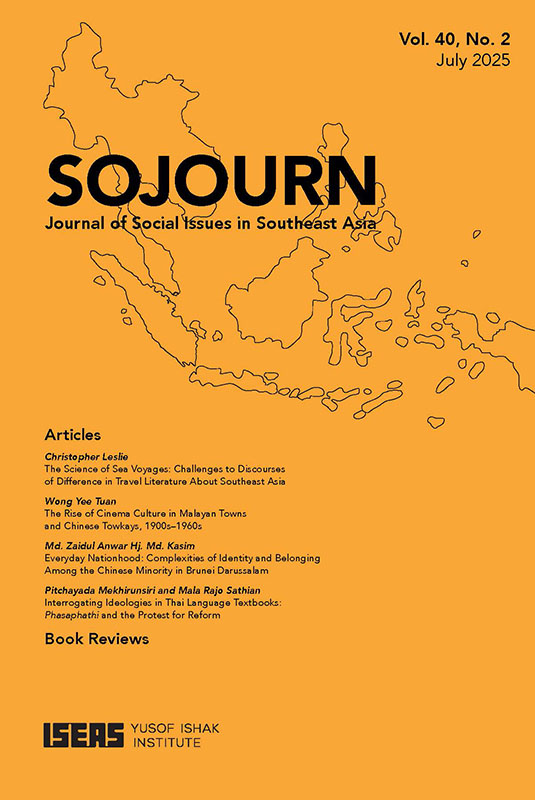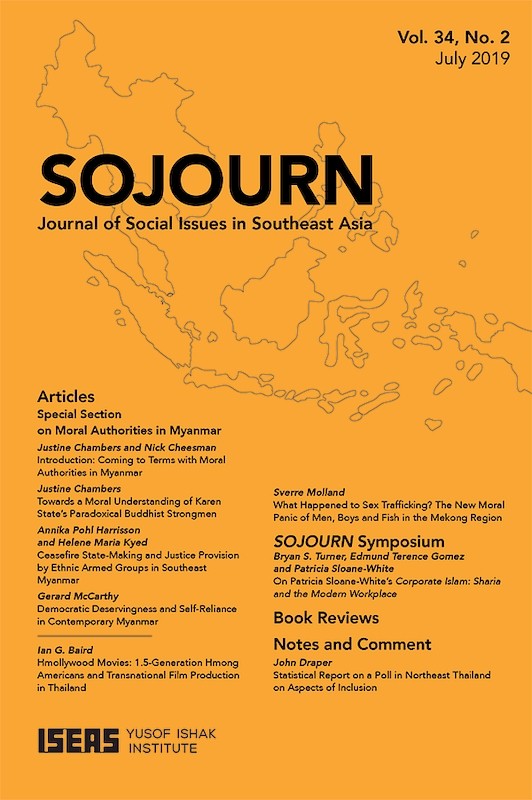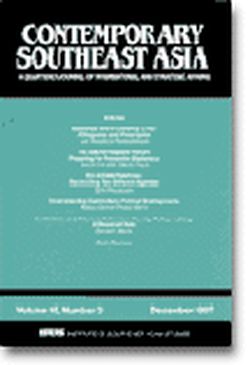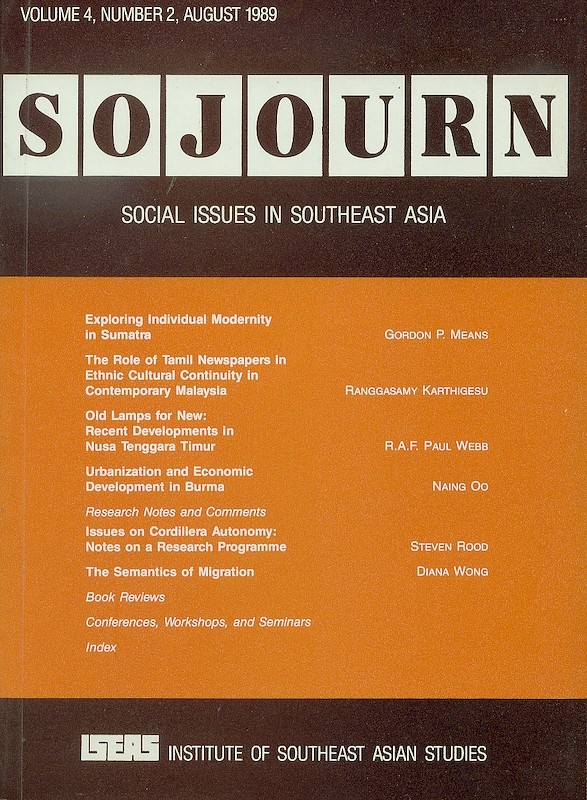SOJOURN: Journal of Social Issues in Southeast Asia Vol. 13/1 (Apr 1998)
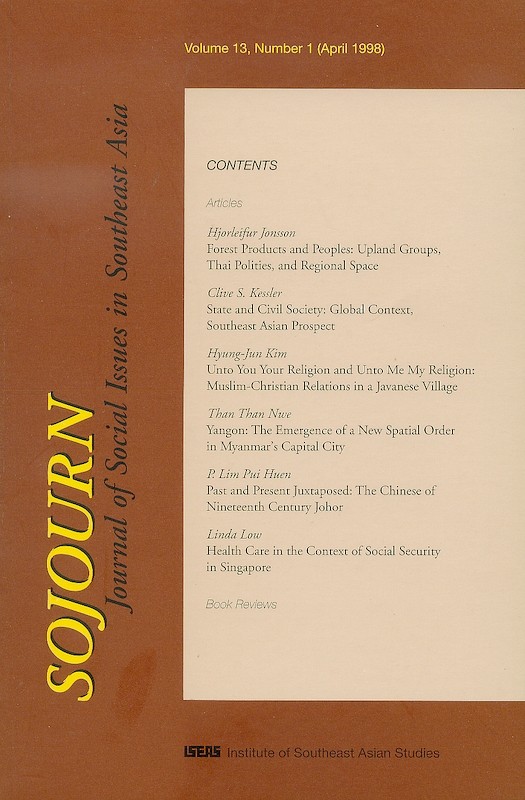
Date of publication:
April 1998
Publisher:
Institute of Southeast Asian Studies
Number of pages:
181
Code:
SJ13/1
Contents
-
Preliminary pages
-
Forest Products and Peoples: Upland Groups, Thai Polities, and Regional Space, by Hjorleifur Jonsson, contributor see abstractThis article relates problems with the assumptions of village studies, and suggests ways of turning these issues towards region and history. The case concerns ways in which communities of Karen have been caught up in internal tensions as well as regional dynamics of both world-view and political economy, and how in the current context marginal communities such as Karen villages are framed by decisions at national and international levels.
-
State and Civil Society: Global Context, Southeast Asian Prospect, by Clive Schofield, contributor see abstractGlobalization has not entailed the "eclipse" of the nation-state. While state sovereignty has been eroded, international society still remains organized as a network or "club" of nation-states which jealously guard their borders, especially to control the massive labour migration unleashed by the forces of economic globalization. States increasingly establish their relations to individuals less on the basis of their relations to their "citizens" than through the processes of their management of these transhuman "pariahs" (to borrow Hannah Arendt's dichotomy). These developments make necessary a reaffirmation of the life of active citizenship within "civil society", a domain of public human action intermediate between the family and the state. Some impediments hindering, and also prospects for, grounding the concept of "civil society" within the political idioms and cultures of Southeast Asian civilization are noted, as are the impact of the region's colonial legacy and its characteristic post-colonial state structures. Tensions are noted in contemporary Southeast Asia between the impulse to achieve "modernity" via participation in the borrowed sophistication of "brand-name" international consumerism and the enlargement of active citizenship, civil society, and the human space of public civic culture.
-
Unto You Your Religion and Unto Me My Religion: Muslim-Christian Relations in a Javanese Village, by Hyung-Jun Kim, contributor see abstractThis article examines Muslim-Christian relations in a Javanese village at the point at which the centrality of Islam in the everyday lives of Muslims has come to the fore and the religion becomes a factor in framing their perceptions of things around them. It shows that unlike the former situation in which religious difference was not a basis of social conflict, religious identity has been felt strongly in everyday interactions. A clear line demarcating the Muslim community from its Christian counterpart has been constructed and religious difference has been utilized to guide individual and collective actions. With these, the daily lives of Muslims, which were previously perceived to be outside the boundary of religion, have become a concern of Muslims as a group.
-
Yangon: The Emergence of a New Spatial Order in Myanmar's Capital City, by Than Than Nwe, contributor see abstractChange has marked Yangon, Myanmar's capital city in recent years. Most notably the establishment of three new towns by the ruling State Law and Order Restoration Council (SLORC) in the late 1980s increased the city's area to more than twice the previous area. The rapidity with which the most recent new towns were established, their size, and the radical change in the shape of the city brought about by the creation of these new towns, or townships, set them apart from new towns developed in the late 1950s and early 1960s. Two major components of Yangon's growth, demographic and areal expansion, are the focus of this article, which draws attention to the political dimension of urban growth in Myanmar.
-
Past and Present Juxtaposed: The Chinese of Nineteenth Century Johor, by Patricia Lim Pui Huen , contributor see abstractThe Johor Bahru Central District Master Plan aims at restructuring the city as a high-technology financial centre and the gateway to the rapidly industrializing region of south Johor. When it was unveiled to the public in February 1997, Chinese organizations were dismayed to note that an important arterial road named after a prominent Chinese would be replaced by gardens and a city walk to be named after Johor's first Sultan and appealed against the removal of the road. Several roads in Johor Bahru are named after nineteenth century Chinese pioneers whose names and biographies form part of the Chinese historical memory in which ideas of history, nostalgia, and heritage have come together to engender a sense of place. This article discusses the history of the Chinese in nineteenth century Johor to show how the Chinese cultural space was created, how it has been affected by the changes proposed, and how the Master Plan have juxtaposed the past and the present together.
-
Health Care in the Context of Social Security in Singapore, by Linda Low, contributor see abstractThis article examines health provisions in the context of social security in Singapore and argues that the principles underlying health care and old age provisions are compatible. The Central Provident Fund (CPF) and its health schemes such as Medisave and Medishield, complemented by Medifund, are depicted in the article as instrumental in encouraging people to save and manage their own health care in a self-reliant manner. The CPF has another important dimension in promoting socialization between the old and young through family-oriented schemes. A communitarian element is also observed in both health policy and old age security as the government devises schemes to draw in a network of providers beyond employers and the state.
-
BOOK REVIEW: Contesting Space: Power Relations and the Urban Built Environment in Colonial Singapore. By Brenda S. A. Yeoh, by Yao Souchou, contributor
-
BOOK REVIEW: Loggers, Monks, Students, and Entrepreneurs: Four Essays on Thailand. By Bryan Hunsaker, Theodore Mayer, Barbara Griffiths, and Robert Dayley
-
BOOK REVIEW: The Coming of the Gods. An Iban Invocatory Chant (Timang Gawai Amat) of the Baleh River Region, Sarawak. By James Jemut Masing

